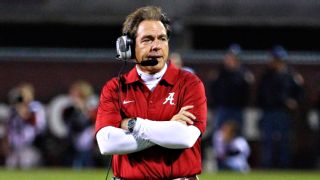Dr. Julian Bailes has been around the game for more than 30 years. He's the chairman of the Department of Neurosurgery and co-director of the NorthShore Neurological Institute in Evanston, Ill.
"I think it's not accurate when people say we have to study this because we don't have any evidence or know anything about it," Bailes said. "I don't think that's true. I think we have some facts and do know something about it. Now, we probably should study it more. But to say we don't know anything about this is disingenuous and inaccurate."
In particular, Bailes points out that studies have shown that players are seven times more at risk to be injured in games than in practice.
"If you play more snaps, you're going to have more exposure. I think that's a fact," said Bailes, who's been a consultant for the NFL Players Association and an advisor to the NCAA. "It bears very serious consideration on whether the game should be slowed down or have fewer plays if you believe exposure equals injury risk or player safety.
"We know if you play another 20 to 25 snaps a game, you're going to have more exposure to all injuries, and you're going to have more potential for concussions, and you're going to have more blows to the head, whether they call them concussions or not."
Saban, whose Crimson Tide have won three of the last five national championships, has been a lightning rod ever since it was revealed that he addressed the NCAA football rules committee last month in Indianapolis. He's on record as saying that he doesn't think football should necessarily be a continuous game. He'd like to see the officials dictate the pace of the game more so than offenses, similar to what happens in the NFL.
Arizona coach Rich Rodriguez recently made fun of the proposed 10-second rule in a YouTube video that spoofs the movie "Speed."
"Let's not distort the facts because of your personal agenda," Rodriguez said.
Clemson's Dabo Swinney said the rule "makes no sense" and added that to "hide behind player safety is wrong because it's just not factual."
Saban hasn't backed down. He said he'll adjust regardless of what the rules are, but maintains that the increasing pace of play in college football logically lends itself to more injuries. He also points out that the NFL has done a better of job controlling the pace.
"I always go back to what they do in the NFL because they spend millions of dollars to figure out what's best for the game," Saban said.

In 2013, the highest average number of plays being run per game in college football was 90. In the NFL, the highest average number of plays being run was 72.
Moreover, Chip Kelly's Oregon offenses in 2012 averaged 83 plays per game. With the same offensive philosophy, Kelly's Philadelphia Eagles' offense last season ran an average of 65 plays per game.
"Our game's getting to where it's not about blocking and tackling," Saban said. "It's about how fast can we go so they can't get lined up. Is that what we want the game to be?
"But let's not forget the issue here. The issue I'm arguing for is the increased number of exposures, the player safety issue. I don't see how logically it can't be, but we should at least do a study to find out. I guess the question is: How do we manage it in the meantime? Do we let them keep going, or do we slow them down?"
Air Force coach Troy Calhoun, the NCAA football rules chairman, declined to comment Tuesday through his school's spokesman. But a source close to the committee told ESPN.com that Saban's comments to the committee last month were confined to player safety and the administration of the game by the officials.
"The 10-second rule was not Nick's idea," the source said. "By the time he came into the room, the committee had already discussed and covered that topic. He talked about the likelihood of more plays leading to more injuries."
Also, that same source told ESPN.com that a similar proposal was on the table last year to slow the pace of play, a proposal that would have established a defined period of time in which the ball couldn't have been snapped following a first down.
"One of the charges has been that this came out of left field, that nobody had ever heard about it," the source said. "A similar proposal last year failed on a tie vote. It was basically the same thing, but doing it after a made first down."
Saban thinks there's something fundamentally wrong with college players being asked to play more plays in a game than NFL players. He wouldn't be opposed to college football following the NFL's lead and no longer stopping the clock after first downs, although that's a change that wouldn't be possible until the 2015 season.
"I think that would shrink the game some," Saban said. "Everybody's trying to characterize what I'm trying to say and crawl into my head, but I can't emphasize enough that the player safety issue is what's at issue here."
Bailes, who's also the medical director for Pop Warner Football in the United States, would like to see just as much emphasis placed on reducing exposures in games as practice.
"We work hard at the Pop Warner level and right on through the professional level to reduce unnecessary contact in practice, so I don't know how you can focus on reducing unnecessary contact in practice, but on the other hand, increase it in games by having more plays and not think that you're going to have less player safety," Bailes said.

